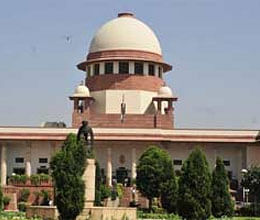
The Supreme Court Monday declined to interfere with the Right to Education Act which provides for free and compulsory elementary education without holding back the promotion of a child to next class till class 8.
Rejecting a plea by petitioner Abhishek Gupta seeking the stay of section 16 of the act, a bench of Justice H.L.Dattu and Justice S.A.Bobde asked him to be constructive and positive in his approach.
"You always have a positive thinking and constructive teaching. When a teacher takes salary he will teach... Don't be negative," Justice Dattu said as Gupta sought to argue as to the futility of such a free and compulsory education sans learning.
The petitioner had sought the stay of the section 16 which says: "No child admitted in a school shall be held back or expelled from the school until completion of elementary education."
Contending there were several scenarios where students were getting promoted even without learning, Gupta told the court that under the right to education scheme, "passing is compulsory and education is optional". He argued that RTE makes the learning and teaching process doubtful.
"Repetition is the essence of education. If repetition goes, then there is no learning," Gupta said adding that the government through RTE was promoting the students without education.
Mocking the provision, Gupta said, "If a teacher does not teach, the child is passed. (It relieves teacher from the duty of teaching). If a child does not learn, child is passed. (It relieves child from the duty of learning). If a child does not attend school, child is still passed. (It relieves child from the duty of attending the school) and this together, relieves the government from the duty of educating the children of our country.
Unable to agree with the petitioner, the court asked him: "Why you get the idea if they go to school they will not learn anything? You teach them the basics. It is not that without studying they will pass."
Rejecting a plea by petitioner Abhishek Gupta seeking the stay of section 16 of the act, a bench of Justice H.L.Dattu and Justice S.A.Bobde asked him to be constructive and positive in his approach.
"You always have a positive thinking and constructive teaching. When a teacher takes salary he will teach... Don't be negative," Justice Dattu said as Gupta sought to argue as to the futility of such a free and compulsory education sans learning.
The petitioner had sought the stay of the section 16 which says: "No child admitted in a school shall be held back or expelled from the school until completion of elementary education."
Contending there were several scenarios where students were getting promoted even without learning, Gupta told the court that under the right to education scheme, "passing is compulsory and education is optional". He argued that RTE makes the learning and teaching process doubtful.
"Repetition is the essence of education. If repetition goes, then there is no learning," Gupta said adding that the government through RTE was promoting the students without education.
Mocking the provision, Gupta said, "If a teacher does not teach, the child is passed. (It relieves teacher from the duty of teaching). If a child does not learn, child is passed. (It relieves child from the duty of learning). If a child does not attend school, child is still passed. (It relieves child from the duty of attending the school) and this together, relieves the government from the duty of educating the children of our country.
Unable to agree with the petitioner, the court asked him: "Why you get the idea if they go to school they will not learn anything? You teach them the basics. It is not that without studying they will pass."








